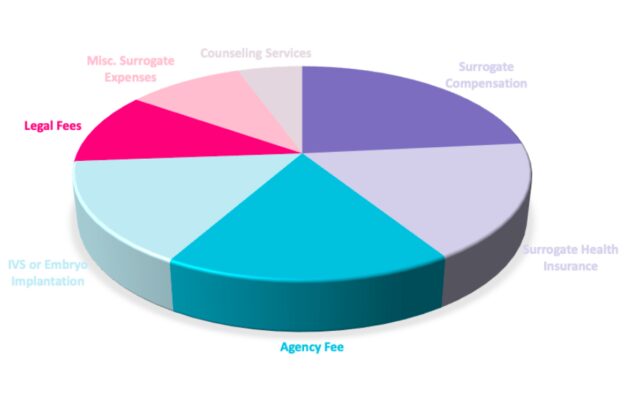
This is one of the most common questions asked by expectant parents. And it is logical. Most often, questions arise where people need a better understanding of the process. And especially in matters related to the life and health of their children. And in issues with a long list of expenses, which is less significant than life and health issues, but just as crucial for making the final decision.
Therefore, it is worth looking into this in more detail. And finally, find out whether health insurance covers the costs of surrogacy. To do this, let’s look at the processes involved in surrogacy, how much it costs, and, finally, whether the price is likely to be covered by health insurance.
The Main Things You Should Know

There is no easy answer to this question. Many factors can affect this question. In particular, it depends on the type of insurance you have. Generally speaking, the answer to this question is often no. Most commonly used insurance policies cover only a partial cost of the entire process. However, there are a lot of nuances and clarifications. For example, some insurance policies cover reproductive technologies only if the surrogate’s eggs are used. More often, however, the costs of the surrogate’s living expenses during pregnancy are covered, but the actual treatment required to get pregnant is not. And, of course, it should be borne in mind that the rules for calculating reimbursements can vary greatly not only from country to country, but also from surrogate agency to surrogate agency.
Does the Insurance Cover the Surrogacy Costs for the Surrogate and Child?

No surrogacy program is ever started until suitable health insurance is approved. As a rule, everything should be specified in the contract. But most often, there is no mention of recovery months; only the period of pregnancy is specified. It is also essential to understand that any pregnancy, including a non-surrogate pregnancy, can deviate from the plan. There may be different scenarios, but agreeing on the most comprehensive insurance contract is necessary before starting a surrogacy journey. Therefore, here is an algorithm of actions that you should follow to make sure that you have done everything possible to ensure life and health:
- Find a surrogate agency that you fully trust
- Talk to a lawyer who works in the surrogate agency
- Draw up an individual insurance policy
- Please read it carefully (especially the small print)
- And only then sign it.
How Much Does Health Insurance for a Surrogate Cost?

Many people are surprised that there could be any questions about this issue. But remember that there will always be a lot of paperwork in any business related to life and official appeals. This means a lot of legal problems. Therefore, the only right thing to do is to work with a lawyer who will deal with your case personally. He will treat it as unique and find the right approach to it. After all, every story is fantastic.
Of course, the issue of surrogate insurance comes up often. This means that such insurance plans are available. However, it is worth noting that surrogates who carry a singleton and twin pregnancy have more choices regarding insurance and health insurance. Triplets and higher are more complicated. You really can only do with consulting a legal expert.
If you try to reduce it to the statistical average, the price itself varies up to $15,000. But it is worth remembering that this is a generalized amount. Your final check can be either more expensive or cheaper. In the same case, if your insurance plan exclusively aims at surrogacy and covers only this, the price will be higher. On average, a surrogate carrying a singleton pregnancy will cost about $28,000. And for a twin pregnancy, it will cost about $45,000.
Therefore, it is worth emphasizing again that each situation is unique and requires a personalized approach to its solution.
Does the Surrogate’s Insurance Cover the Newborn Child?

First of all, it is worth noting again that each country has its own legislation regulating all processes of surrogacy and medicine in general. Therefore, the following answer will be generalized and require further consultation.
But for the most part, the surrogate’s insurance does not cover the child she gives birth to because the child is not her dependent. Therefore, it is not covered by the surrogate’s insurance. By law, only medical expenses directly related to pregnancy are covered. All other costs are not. In particular, the insurance policy does not cover IVF cycles.
Although there are no definite answers and exceptions to every rule, it is worth discussing such topics because they are directly related to your future children. Mindfulness is always a good idea. That is why all the leading experts in the field of surrogacy work fruitfully with lawyers immersed in surrogacy. After all, every day, there are shifts in the issue of legalization, prohibition, or changes in legislation, including surrogacy and, obviously, the insurance policy.
In addition, if a child needs specialized medical care after, for example, a premature birth, there are two options. The first is to open a new medical policy for the child. The intended parents should do this. In general, it can cost up to $25,000. However, if you are a US citizen, you can add a new family member to your current policy.
On average, it is not strange for a premature baby to spend several weeks in a medical facility. And one day’s stay there can cost about $5,000. So, yes, of course, you need to take care of the insurance policy for your newborn child. To be sure that everything will be in place after the birth.
So, living in the age of crazy technologies and even artificial intelligence, exploring space, and looking into unknown underwater lands, we still have to remember that the real miracle happens here on earth, among people. We all went through it – the process of birth. In addition to extraordinary happiness, this procedure makes people want to trace and regulate all stages of this miracle, including insurance medicine.









